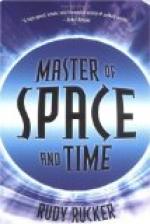After his graduation from Yale in 1810, Morse devoted himself entirely to the study of art, still being dependent upon his parents for support. He secured the friendship and became the pupil of Washington Allston, then a foremost American painter. In the summer of 1811 Allston sailed for England, and Morse accompanied him. In London he came to the attention of Benjamin West, then at the height of his career, and benefited by his advice and encouragement.
That he had no ambition other than his art at this period we may learn from a letter he wrote to his mother in 1812.
My passion for my art [he wrote] is so firmly rooted that I am confident no human power could destroy it. The more I study the greater I think is its claim to the appellation divine. I am now going to begin a picture of the death of Hercules, the figure to be large as life.
When he had completed this picture to his own satisfaction, he showed it to West. “Go on and finish it,” was West’s comment. “But it is finished,” said Morse. “No, no. See here, and here, and here are places you can improve it.” Morse went to work upon his painting again, only to meet the same comment when he again showed it to West. This happened again and again. When the youth had finally brought it to a point where West was convinced it was the very best Morse could do he had learned a lesson in thoroughness and painstaking attention to detail that he never forgot.
That he might have a model for his painting Morse had molded a figure of Hercules in clay. At the advice of West he entered the cast in a competition for a prize in sculpture, with the result that he received the prize and a gold medal for his work. He then plunged into the competition for a prize and medal offered by the Royal Academy for the best historical painting. His subject was, “The Judgment of Jupiter in the Case of Apollo, Marpessa, and Idas.” Though he completed the picture to the satisfaction of West, Morse was not able to remain in London and enter it in the competition. The rules required that the artist be present in person if he was to receive the prize, but Morse was forced to return to America. He had been in England for four years—a year longer than had originally been planned for him—and he was out of funds, and his parents could support him no longer.
Morse lived in London during the War of 1812, but seems to have suffered no annoyance other than that of poverty, which the war intensified by raising the prices of food as well as his necessary artist’s materials to an almost prohibitive figure. The last of the Napoleonic wars was also in progress. News of the battle of Waterloo reached London but a short time before Morse sailed for America. It required two days for the news to reach the English capital. The young American, whose inability to sell his paintings was driving him from London, was destined to devise a system which would have carried the great news to its destination within a few seconds.




